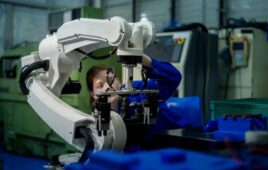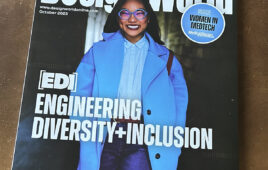Kristin McKenzie , Senior Director of Information Technology, Digi-Key Electronics
B.S. Computer Science, SCL
University of North Dakota

Kristin McKenzie is senior director of information technology at Digi-Key Electronics, a $4.7 billion company ranked the fifth largest electronic component distributor in the world. She thrives on leading technical teams and solving complex global business and IT challenges to drive business value.
Kristin leads an organization of agile development teams who support critical business applications for Digi-Key’s sales and operations capabilities. Presently, her primary focus is leading a large technology transformation program for Digi-Key targeting digital first, enabling rapid growth and driving an exceptional customer experience.
She has worn many hats in her technology career spanning almost three decades, spending her first 12 years writing code as a software engineer and eventually moving into various leadership roles over software development, business analysis, program management, agile practices and international expansion initiatives. Her prior roles include director of international technology development, director of strategic IT initiatives, director of new market development and director of project management office.
She graduated summa cum laude from the University of North Dakota in 1995 and holds a bachelor’s degree in computer science with a concentration in communications. Kristin is also an executive board member for the University of North Dakota College of Engineering and Mines.
Talk about the culture at your company. What makes it inclusive or supportive of women in engineering and automation?
I’ve been fortunate with my experience at Digi-Key, which is why I’ve been with the organization over 27 years. It’s just a good company. One of our core values is “People Make the Difference,” which has held true throughout my career. Our people are Digi-Key’s secret sauce. I get to work with a lot of smart, creative and dedicated team members who inspire me to do better in my own role. Technology has always been viewed as a differentiator at Digi-Key. Even early in my career, I felt like I was making an impact and contributing to the success of the company. There’s always been a sense of purpose and value.
Digi-Key respects women in engineering. I was the first female software engineer hired by the company and was involved in recruitment and mentoring engineers for about 10 years before moving into various leadership roles. It’s been wonderful to see how many bright and capable women in tech have joined Digi-Key over the years.
Overall, we have a great group of women leaders in the company. Digi-Key is an active sponsor of Women in Electronics, which is a community of progressive women leaders dedicated to expanding the opportunities for women in the electronics industry.
Describe a recent company project (in which you were involved) that went particularly well. How did you and your team go about ensuring success?
Digi-Key launched a marketplace in 2020, which was an exciting initiative to provide a one-stop shop for all aspects of technology innovation. We rapidly expanded our breadth of products and suppliers available to design engineers through this program. Our team really focused on the customer experience and seamlessly supporting Digi-Key and Marketplace product in the same shopping cart, which was more challenging than it sounds. We’ve been constantly improving the supplier and customer channels over the past couple years and offering new capabilities like a PCB Builder tool and the DKRed program, which allows makers, hobbyists and students to order custom circuit boards (PCBs).
What first drew you to engineering and this industry?
My small-town high school required all students to take an introductory computer programming class. Back in the late 80s, this was uncommon and fairly progressive as most homes didn’t even have a computer. I enjoyed the blend of creativity and problem solving and became hooked on coding. I majored in computer science in college without fully understanding what the degree even involved or the type of opportunities it would bring.
In retrospect, that naiveté was a blessing. For one, the reality was that all my computer science classes were at least 85% male. There were often only two or three women in any given class; sometimes I was the only female. Had I known before how male-dominated the field was, I might have been intimidated going into that major. I also never anticipated the explosive growth in technology and engineering in the years to come. The opportunities to learn and develop new skills seem endless. You’re a lifelong learner in technology. It’s never stagnant!
Describe your biggest career challenge. How did you solve it — or what was the outcome or lesson learned?
I’ve had an opportunity to work on several innovative programs for Digi-Key, including international growth initiatives that pulled me further away from my technology roots and focused more on business operations in new markets, primarily China. I had no experience with business in China, and the learning curve was significant. It was great training ground from both a business and cultural perspective. The language barrier and time zone differences could be challenging, which meant everything took more time. Building trust and rapport between our U.S. and China team members and partners was essential. While I’m not involved in the business side today, my team still supports the technology for our China operations, and I continue to have a strong affinity for our business team in Shanghai.
What career advice would you give to your younger self?
Be confident in your own abilities and have courage. This is also the advice I give to teens and middle-schoolers when speaking to organizations like Girls Who Code. Studies show that girls and boys are equally as confident until about the age of 12, then confidence levels drop off fairly significantly for girls. There are multiple factors, but perfectionism is one of them. Sometimes the highest performing female students don’t try something new, mostly due to the fear of failure. I’ve grown the most in my career when I’ve been thrown into something completely out of my comfort zone.
Filed Under: Engineering Diversity & Inclusion




